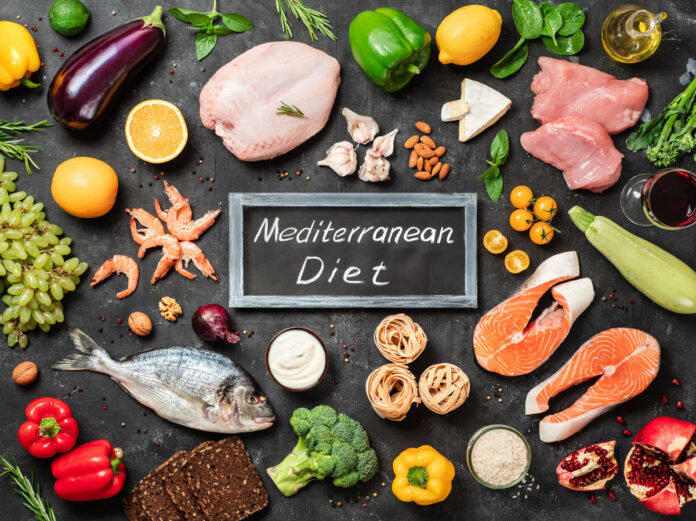The Mediterranean diet is a heart-healthy eating pattern inspired by the traditional cuisine of countries bordering the Mediterranean Sea, such as Italy, Greece, and Spain. Known for its health benefits, this diet emphasizes whole foods, healthy fats, and balanced nutrition. Here’s a detailed look at the key aspects of the Mediterranean diet:
1. Core Components of the Mediterranean Diet
- Fruits and Vegetables: High intake of fruits and vegetables provides essential vitamins, minerals, antioxidants, and fiber. Typically, five to ten servings per day are encouraged.
- Whole Grains: Whole grains like oats, brown rice, and whole-grain bread are prioritized over refined grains.
- Healthy Fats: Olives and olive oil are key components, providing healthy monounsaturated fats, which are linked to lower levels of LDL (bad cholesterol).
- Lean Proteins:
- Fish and Seafood: Rich in omega-3 fatty acids, fish and seafood (especially fatty fish like salmon, mackerel, and sardines) are recommended several times per week.
- Poultry, Eggs, and Dairy: These are consumed in moderate amounts. Yogurt and cheese are preferred, especially traditional options like Greek yogurt and feta cheese.
- Legumes and Nuts: Beans, lentils, and nuts (like almonds and walnuts) provide plant-based protein, fiber, and healthy fats.
- Minimal Red Meat: Red meat and processed meats are limited to occasional use, often only a few times per month.
- Red Wine: In moderation (usually one glass per day for women and up to two for men), red wine is allowed due to its antioxidant properties, though it’s not required for the diet.
2. Cooking and Preparation Methods
- Minimal Processing: Foods are typically consumed in their most natural state with minimal processing, which preserves nutrients.
- Simple Cooking Techniques: Grilling, roasting, or baking is preferred over frying, as these methods require less oil and preserve nutrient integrity.
- Herbs and Spices for Flavoring: Instead of salt, herbs like basil, oregano, thyme, and spices such as cumin are used to add flavor, which can help lower sodium intake.
3. Lifestyle and Social Components
- Meals as Social Events: Mediterranean culture emphasizes eating together as a family or community, which can improve well-being and foster mindful eating habits.
- Physical Activity: The diet is often paired with an active lifestyle, incorporating daily physical activity such as walking, cycling, or other forms of exercise.
4. Health Benefits of the Mediterranean Diet
- Heart Health: Studies have shown a reduced risk of heart disease due to the diet’s healthy fat profile, fiber, and antioxidant-rich foods.
- Brain Health: The diet’s nutrients, especially omega-3s from fish and antioxidants from fruits and vegetables, support cognitive function and may help reduce the risk of Alzheimer’s disease.
- Reduced Risk of Type 2 Diabetes: A Mediterranean diet’s balance of complex carbs and healthy fats can help improve blood sugar control.
- Weight Management: The high fiber content and nutrient density of the diet can help maintain a healthy weight, reducing the likelihood of obesity.
5. Adapting the Mediterranean Diet in Daily Life
- Breakfast: A typical breakfast may include whole-grain toast with avocado, a bowl of yogurt with fruit and nuts, or oatmeal with berries.
- Lunch: This could be a salad with leafy greens, olives, grilled chicken or fish, and a vinaigrette made with olive oil and lemon.
- Dinner: A balanced meal may include grilled fish or chicken with a side of roasted vegetables, a small portion of whole grains, and a drizzle of olive oil.
- Snacks: Fresh fruit, a handful of nuts, or hummus with raw vegetables are ideal Mediterranean-inspired snacks.
6. Potential Drawbacks
- Cost: Some components like fish, nuts, and olive oil can be expensive, which may make the diet less accessible.
- Time and Effort: Preparing whole, fresh foods can be time-consuming compared to processed options.
- Caloric Intake: Some foods in the diet, like nuts and olive oil, are calorie-dense, so portion control is essential for those focusing on weight management.
7. Scientific Support
- Studies consistently support the health benefits of the Mediterranean diet. It’s one of the most researched diets for long-term health, showing strong evidence in reducing the risk of heart disease, cancer, and overall mortality rates.
The Mediterranean diet isn’t just a way of eating; it’s a lifestyle approach that incorporates healthy foods, active living, and social interaction, offering a balanced approach to overall wellness.



